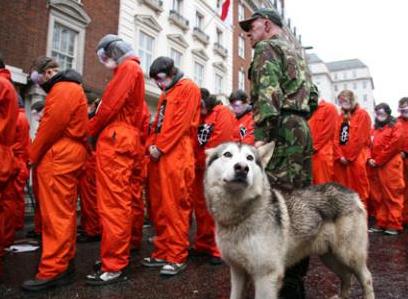British police to probe Guantanamo Bay torture claims
 London - The story of alleged British complicity in the torture of a Guantanamo Bay prisoner took an extraordinary twist Thursday when police were asked to investigate the role of the country's own intelligence services.
London - The story of alleged British complicity in the torture of a Guantanamo Bay prisoner took an extraordinary twist Thursday when police were asked to investigate the role of the country's own intelligence services.
After several months of investigations, Britain's Attorney General, Baroness Scotland, said she had asked Scotland Yard to probe whether any criminal offences had been committed in the case of Binyam Mohamed, a detainee released from the notorious prison camp a month ago.
Mohamed, an Ethiopian national who came to Britain as a refugee in the mid-1990s but is not a British national, has alleged that information provided by Britain's MI5 intelligence service "directly led" to his torture during seven years of captivity.
A police probe would be the "appropriate course of action," said Scotland, adding that it should be carried out with "seriousness and sensitivity."
The move was immediately welcomed by human rights groups and by Britain's two main opposition parties - the Conservatives and the Liberals - who have long asked for a full independent inquiry into the allegations.
Prime Minister Gordon Brown, who is on a visit to Brazil, said that while his government did not tolerate or endorse torture, he felt it necessary to give his unequivocal support to the security services.
"I want to stand up for our security services because they cannot stand up for themselves," Brown said in a statement.
At a time where the threat from terrorism was "very great," the security services had done an "amazing and courageous job," said Brown.
The BBC reported it was the "first time in living memory" that British police had been asked to investigate MI5, the counter- intelligence service with whom it would usually work "side by side."
Mohamed, 30, who was arrested at Karachi airport in Pakistan in 2002, has alleged that he was tortured in Pakistan, Afghanistan and at a "secret site" in Morocco, before he was sent to Guantanamo Bay, Cuba in 2004.
Since returning to Britain, where he lived before his arrest, he has provided documents to prove that the questions he was asked during his interrogation could "only have come" from British intelligence.
The allegations focus on an MI5 officer known only as Witness B, who travelled to Karachi in 2002 to question Mohamed. It is alleged that Witness B told Mohamed that his "only way out of Pakistani custody" was to cooperate fully.
The officer told him that he knew the destination to which Mohamed would be transferred under the United States' Central Intelligence Agency's (CIA) discredited "extraordinary rendition" scheme.
Mohamed said on his return to Britain that his "worst moment" came when he realized the alleged collusion after his transfer to Morocco.
"The very people who I had hoped would come to my rescue ... had allied themselves with my abusers," he said.
The US authorities originally accused him of being involved in a plot to stage a "dirty bomb" attack on a city in the US, but dropped the charges last October.
In London, Amnesty International on Thursday welcomed the opening of a police investigation and said there needed to be a wider inquiry into allegations made by Mohamed "and others."
Conservative leader David Cameron echoed the call for an independent probe, that could possibly be headed by a judge.
The allegations made by Mohamed were "disturbing and worrying," Cameron said. "We must remove this potential stain from Britain's name." (dpa)